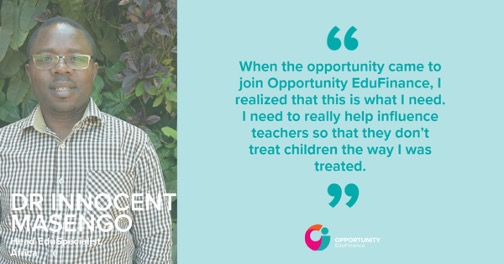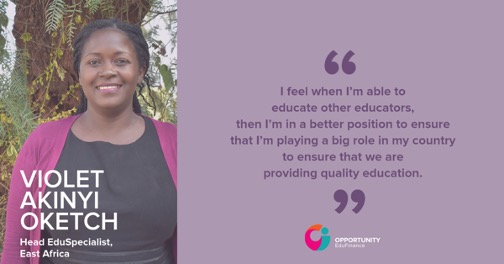Educating Educators: An interview with our EduQuality Program Leaders

As our EduQuality program continues to grow, we wanted to hear from our leaders about their own backgrounds and perspectives on education, as well as where they see the current challenges and opportunities. We spoke to Innocent, Violet, Samuel and Renée for their reflections on education.
Why did you want to work in education? And why did you then want to work educating other educators?
VIOLET: I was a teacher in a classroom. Most of the children that used to come could not read. We were working in a rehabilitation center and we were trying to get children from the streets to come in. We worked with them to ensure that they got to the right level.
During this time, I was interacting with different teachers, and one day I came across an advert with Education Development Trust, and they were looking for educators to do research in reading and numeracy with teachers within the slums. So that is where I started my journey of being an educator, educating other educators, and the passion that I have for teaching. I feel when I'm able to educate other educators, then I'm in a better position to ensure that I'm playing a big role in my country to ensure that we are providing quality education. I think we are still living my dream of seeing a better world where all children are reading, achieving and reaching their potential.
INNOCENT: So initially, I didn't want to become a teacher because as a learner, I was abused by my teachers. I really, really did not like teachers and did not want to be one.
At University, one of the programs that attracted me was education. As a young teacher, I did make some mistakes but as I grew in the role, I realized those mistakes. However, my fellow teachers were still doing those mistakes. They were still treating children the way I was treated when I was 11. And I did not have the power to change much because I was a junior teacher.
When the opportunity came to join Opportunity EduFinance I realized that this is what I need. I need to really help influence teachers so that they don't treat children the way I was treated. I'm hoping to do much more in this role across Africa because we find that there are cross-cutting issues in as far as teaching and learning is concerned.
SAMUEL: I'm a trained teacher and I taught for about 20 years. I was in the public sector then later on I joined a private school and I rose to become the headmaster of a junior high school. And there is this challenge that I realized. In Ghana, we have some of the best policies for the developing education sector, yet sometimes the policies are not implemented at all.
I had the opportunity to also be involved in teacher training, where the University of Cape Coast employed me to be part of the distance education program where I was teaching several courses, including measurement and evaluation, psychology of education and mathematics. I realized that by training teachers in private schools and through education, we could reduce poverty.

What is the structure of the EduQuality team now, and how has it changed in recent years?
RENÉE: It has grown and changed significantly. EduQuality first started with a team of consultants who had subject matter expertise. And then as the program grew, we transitioned some of those consultants to full-time employees and started to hire more full-time employees.
The first thing you have to look at is people because you need people to deliver your programming. You need to make sure you have the right kind of people and that they have the right type of support to be able to grow the program effectively. We started doing assessments of the different types of roles, creating a kind of a pyramid so that there were enough managers to support teams effectively.
We have leadership and strategy, which is my role. We have the content development team, which oversees all of the training materials across the program, then we have the project management team, which helps with logistics and special projects. And then we have the implementation team, who are a massive team of education specialists who deliver the program every day.
And so, everything that we do - on content, on leadership, on project management - is to support the implementation team to do their job effectively.
- We have the Head Education Specialists at the top who manage both country teams and regional teams.
- Then we have the Senior Education Specialists, who usually have a lot of expertise, particularly subject matter expertise.
- Then we have Education Specialists, and then Assistant Education Specialists, people who are skilled, but may be working for an NGO for the very first time. Now they'll be tasked with training hundreds of teachers and school leaders and might need a little bit of extra support making that transition, but are perfectly capable of doing the work overtime.
We've created a structure where staff can grow professionally, have opportunities for mentorship, have opportunities to engage with leadership opportunities as well, working on special projects. We’ve had a lot of evolution. When I first started we had about 12 education specialists and now we have 45 staff.

What are the qualities you need to be a good education specialist?
INNOCENT: One thing is the knowledge that arises from being a qualified and experienced teacher who has delivered lessons in a real classroom setting to a level where you would be in a position to mentor teachers. They need to have emotional intelligence, be self-aware and be able to self-manage and have the social and relationship skills to make good decisions.
VIOLET: You need to be a good listener so that you're able to listen to your clients well, and you're able to be patient with them as they implement the program.
You also need to be someone who is adaptable. At times we'll find that others are in a different environment and if you're not someone who can adapt to that environment then you cannot work with them. Another thing that I've learned in the field of education is that you need to be patient with a team, especially our school leaders, to ensure that we are going to meet the goal.
RENÉE: When I first started, I saw that some education specialists struggled a lot around mobilizing school leaders and teachers to attend sessions. And then there were some who rarely had an issue. And I realized one key characteristic of those who were successful: they were really good at community mobilization and understanding the needs are of that specific community. That's really core to what the self-improving school system is. Our cluster model is bringing folks together for collective action on the challenges that they all face together as a group so that they're ultimately stronger together.

What are the challenges & opportunities you see ahead for the schools EduQuality works in?
INNOCENT: One challenge was why schools taught the way they taught. In a country like Uganda, you have two competing forces. We have the curriculum, but also the examining body and there seems to be a mismatch. And because of that, I find that examining bodies dictates how schools teach, preparing students for exams. They end up using rote learning, coaching learners to pass exams, so that the school can be able to attract more clients because they are a business. And now we are going to have children being treated like robots, even more so than before, to be able to complete the syllabus in the shortest time, so that the schools can remain afloat with the challenge of COVID. These are ongoing challenges that will probably be worse after COVID.
RENÉE: In reference to COVID-19, we've seen that it's exacerbated existing inequalities. I often hear people say about COVID-19 that the pandemic is an equalizer, but I couldn't think of anything that's further from the truth. If you look at Uganda, for example, schools have been closed for 18 months. There are some children who haven't had access to anything at all. The number of children I see outside peddling goods has increased significantly.
We have to make sure that the solutions we provide are diverse enough to reach everyone. And I think it shows the vulnerabilities of the private school sector, and how it hasn't been as resilient to shocks, both macro and micro shocks. There needs to be more done to support the sustainability of the sector. Everyone involved really needs to step in and put more effort there.
I think some positive things that have come out of this is better recognition of how technology can be used. And hopefully we'll see greater connectivity across countries and better training, support and resources provided to schools to use technology more effectively.
VIOLET: I'll talk about gender disparity. So, you find that a girl child is still being denied the right to education. Even in terms of school fees a boy child is given the first priority, and then the girl child is also still be given work at home. Sometimes girls don’t come to school, because they're taking care of their siblings and their parents need to go and look for work.
For the private school sector, they face high teacher attrition just because of their salaries, and they don't have job security. As we are working with school leaders, we find that the trainings that we hold for the teachers are very, very important because motivation actually is not really only about money, but also about what motivation and recognition school leaders give to their teachers.
To learn more about the new Blended Learning Model that our EduQuality Team is implementing with school leaders and teachers utilizing tablets, read our recent blog here.